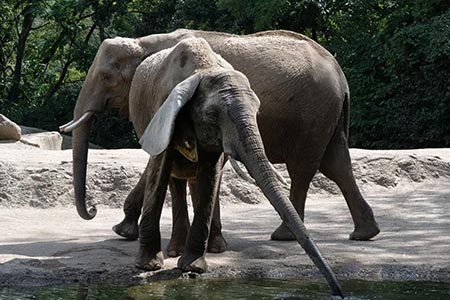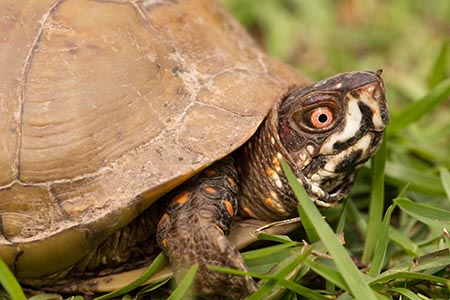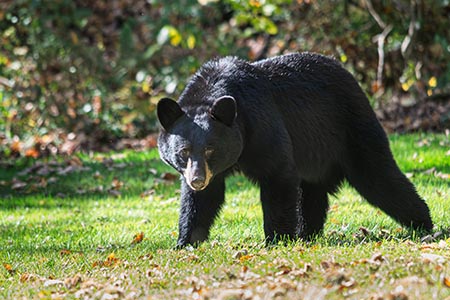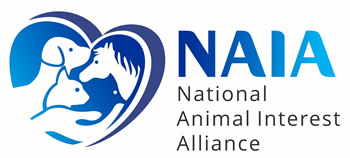
Inside This Issue:
- Thank You for Another Great NAIA Conference!
- As Zoo Restructures Elephant Care Program, Animal Rights Group Files Lawsuit
- Smuggling Bust: Hundreds of Exotic and Protected Animals Discovered Heading into Mexico
- News Bites: Rescue from a Rehabber, Surprise Pet Talents, Beware of Bear, and More!
Thank You for Another Great NAIA Conference!
This past weekend, we held the 35th annual NAIA conference in Virginia Beach, Virginia. We heard two full days of wonderful presentations about animal welfare and the human-animal bond from the perspective of expert breeders, veterinarians, caretakers, enthusiasts, and even lawyers working to protect our animals through responsible legislation. It was an informative, empowering, and inspiring experience – and most importantly, simply a great time! Those of us at NAIA are grateful for the opportunity to share our stories with those who attended and extend our sincerest thank you to all who joined us and worked to make it possible. We can't wait to see you next year.
As Zoo Restructures Elephant Care Program, Animal Rights Group Files Lawsuit

Photo: Pittsburgh Zoo & Aquarium
The Pittsburgh Zoo & Aquarium and its International Conservation Center are restructuring their elephant care program, moving elephants between locations to foster better social dynamics and prioritize each animal’s well-being. Since its inception, the ICC has allowed for Pittsburgh elephants to be a part of both systems of management and also participate in the Association of Zoos and Aquariums Species Survival Plan. Visitors will still be able to see the Zoo’s five female African elephants: Victoria, Zuri, Savanna, Angeline, and Natasha, as well as the Conservation Center’s herd, which includes the bull Jackson and females Seeni, Sukiri, and Bette. The Zoo, partnering with leading conservation organizations, emphasizes world-class care and ongoing work to protect African elephants both in human care and in the wild.
Predictably, the Nonhuman Rights Project filed a lawsuit to seek the release of five elephants from the zoo after the move was announced. Every attempt by the group to win legal personhood for animals has failed in court so far, but it is important to note that their efforts are relentless, and it only takes one sympathetic judge to create a precedent. Meanwhile, the Zoo continues to highlight education, research, and partnerships, both locally and worldwide, that will secure elephants’ future.
Source: Pittsburgh Zoo & Aquarium Planning Future of Elephant Herd
Smuggling Bust: Hundreds of Exotic and Protected Animals Discovered Heading into Mexico

Traffickers can fit a mind-boggling number of tortoises into one vehicle.
When it comes to animal trafficking, we usually write about people smuggling animals into the United States, but that's not always the case. On Wednesday, a Mexican citizen was taken into custody at the Anzalduas International Bridge in Mission after authorities found hundreds of exotic animals hidden in his vehicle during an outbound inspection. The man, Sebastian Cruz-Amaya, now faces charges related to the smuggling of goods, including protected species like snakes, turtles, lizards, frogs, spiders, and centipedes. Investigators say Cruz-Amaya's phone contained messages and invoices showing he regularly handled these animals, often picking them up from shipping companies and moving them across the border into Mexico to be sold to buyers without the necessary permits. Although he reportedly claimed to declare the animals, records suggest he has made more than a hundred such trips over several years, pocketing tens of thousands of dollars for himself after paying others to help him move the wildlife into Mexico.
Despite tighter security and a noticeable decrease in border crossings, the ongoing demand for rare and exotic pets makes the illegal trade extremely lucrative. For smugglers, the money at stake is appealing enough to repeatedly risk arrest. Many of the species being trafficked are protected by international laws, but those protections are not enough to deter operations driven by profit. Cruz-Amaya appeared before a federal judge in McAllen following his arrest, as the investigation continues into the broader network facilitating the trade.
Source: Feds bust man smuggling hundreds of exotic animals
News Bites: Rescue from a Rehabber, Surprise Pet Talents, Beware of Bear, and More!

Massachusetts farmers have lost more than half a dozen goats and sheep to bear attacks recently.
So often in cases of animal neglect and cruelty, there are multiple outside factors involved. An acute family or personal crisis can place animal care on the back burner. Mental illness (especially hoarding) and addiction can be disastrous for animals. In other cases, a caretaker may be suffering from the inevitable mental and physical deterioration that comes with aging or certain diseases. We don’t want to generalize too much, but outside of a few criminal enterprises, cases of animal neglect and cruelty don’t usually start with a person willingly inflicting harm on animals. In fact, there are many examples of animal neglect starting from a place of wanting to save animals.
A recent hoarding case out of Suffolk County, New York, seems to fit in this mold. Here, a certified wildlife rehabilitator was arrested for animal neglect and had over 200 animals – as well as her 95-year-old mother – removed from her home. The sheer number and variety of animals in this case is staggering. It wasn’t just dogs and cats that were seized, but also voles, doves, flying squirrels, chipmunks, and numerous other species. On the bright side, the woman’s elderly mother is no longer trapped in a dangerous, nearly destroyed house, and numerous animal rescue organizations have stepped up to the plate to rehab and rehome the disgraced rehabber’s animals. The woman at the center of this case is certified, and almost certainly began her journey looking to care for animals – this serves as another cautionary, all-too-common tale of how these endeavors, without proper oversight, can spiral out of control into hoarding, neglect, and worse.
Do you think your pet possesses any unexpected or hidden talents? In today’s feelgood story, we spotlight Rico the Wonder Mutt, who was adopted by UK dog trainer, Rachel Rodgers in 2015, after she saw his urgent “adopt this dog in 48 hours or we euthanize him” online ad. Rodgers picked Rico up for the equivalent of $200, and soon discovered through training and playing games with him, that this nervous pile of fur and bulging eyes was actually a brilliant tracker. After this discovery, she began formally training him, and he’s had a wonderful career finding lost pets and other animals – including a capybara that had escaped from the zoo. After suffering a collapsed trachea in 2023, Rico went into semi-retirement, and sniffs mostly for fun these days – but hey, even if he’s not on the big cases anymore, he still gets to do what he loves. What a lucky match Rodgers and Rico have made!
Speaking of heartwarming stories, here’s one we didn’t have time to publicize due to conference preparations – but better late than never! Francine, a beloved cat who lived in a Virginia Lowe’s home improvement store went missing last September. Heartbroken team members searched for her, cameras monitored the scene, flyers went up, thermal drones were deployed, and humane traps were placed throughout the store – but nothing! It seemed as if she had simply vanished. That is, until a camera spotted her roaming among the boxes and pallets… not in Virginia, but 85 miles away, at a North Carolina Lowe’s distribution center. Apparently, Francine stowed away on a loading truck and had herself quite a journey! At this discovery, two Lowe’s employees made a 4 am drive down to North Carolina to pick Francine up, get her to a vet, then brought her back home. It’s a relief that we can chuckle at this story as a humorous misadventure now. Big kudos to the Lowe’s team for going the extra mile (literally) for their friend and mascot!
This next item will come as no surprise to most of our readers, but a recent investigation into pet store bans came to the conclusion that – wait for it! – bans don’t stop bad breeders or do anything to improve the quality of dogs and cats that people get. They are good at raising funds for activists, however.
Finally, beware of bears fattening up for winter. Farmers in Townsend, Massachusetts have recently lost over half a dozen goats and sheep to bear attacks – attacks that were most likely carried out by the same bear. This highlights the risk of teaching bears to associate human homes with plentiful food, as well as the importance of keeping our livestock and pets secure and safe. Don't feed the bears, indeed. Yikes!
Also in the News...
★ Wake County Animal Center waives adoption fees for Halloween (Don't Say Boo About These Shelter & Rescue Opportunities)
★ Shasta County public health says don't touch bats after 2 animals test positive for rabies (Public Health Alerts; Why Are People Touching Bats?)
★ You won’t see these once native animals in West Virginia anymore (Extinction, Conservation, and Reintroduction)
★ “Do Not Eat” advisory issued for wild animals in Kennebec, Waldo counties over PFAS concerns (Hunting & Fishing; Forever Chemicals)
★ Woman attacked by coyote while outside with family dog in New Jersey (Coyote Ugly; [Probably] More Rabies)
★ Fix Them All to hold annual For The Animals Chili Cook-Off and Music Festival (Low Cost Spay & Neuter; Public Events & Adoptions)
★ 20 animal species on the road to recovery: IUCN Red List update (Positive & Unusual Lists; More Bandicoots, Please)
Click here to see what is happening legislatively



